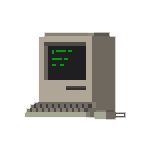Deciphering McLuhan
As I read his work, I will be trying to dig up all the gold nuggets embedded within and trying to parse them out. I've found that for people to begin to understand it, it demands a sort of ... translation.
Over the course of trying to spread the word to friends, I got the sense that his work is incredibly dense, but not because it's convoluted; it's because he views the world through a lens entirely different than from what we are accustomed to. It's hard to characterize it precisely, but in many ways, his points establish a pattern that is INVERTED from what we are typically taught in school.
In school, you learn history as a series of data points based on human events (wars, famines, elections, individual leaders) and then trace the lines between them: "Joe rose to power over Nation X. Nation X began to war with Y and this enabled Z technology. Meanwhile Communist ideals spread." McLuhan's approach is essentially complementary and boils away all the human elements, and you quickly see that he's not merely yammering about televisions and radios. He is all about how media changes people. And he even goes a step further: history is a byproduct of a technological process. Machines aren't built to serve us; we are the machines' reproductive organs.
